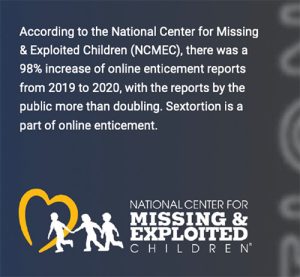WORD, Gregg Morris
So my question is, how does the United States compare to other countries in dealing with this? Is it doing a decent job or just waking it up? Are some countries ahead of the game on this? I was just thinking United States, but this is international.
Filmmaker Stephen Peek
Yeah, I mean, we’ve had the amazing opportunity to partner with some of the brave women and men on the front lines that are trying to keep our kids safe online. And it’s been incredible to see the work that they’re doing, not only here in the U.S. with FBI and Homeland Security and the National Center [for Missing and Exploited Children], but also, Interpol and a lot of the folks in the European Union and the UK.
We’re working with the We Protect Global Alliance. It’s based in the UK, but it’s doing some amazing work to try to keep kids safe online. But Erin Burke, who is in our film, from Homeland Security, she told us, “If we had every single agent working 24/7, 365 on this, we literally would not be able to keep up with the caseload because there’s 80,000 reports every single day coming into the cyber tip line.”
So we realize that we can’t arrest our way out of this problem. We have to shift to prevention. And We Protect puts out a global threat assessment every two years. And their key finding in the UK is that we have to move to prevention to make parents and teens aware of what’s happening online and how to keep them safe. And so that’s very much what our purpose was with the film.
Filmmaker Maria Demeshkina Peek
And I’ll piggyback on that. The key finding actually relates to the victims of this crime and that was the words of the victims. They said, ‘Had we known this could happen to us, we would’ve avoided it.’ So that’s how we know that number one way to prevent this crime from happening is to educate people about the pattern of this crime. The pattern stays the same. MO stays the same no matter what platform you are on, video game or social media platform, the perpetrators use exact same tactics, exact same pattern to target kids. And it hasn’t changed in the last 15 years. So if we can educate them how to avoid this and what to look out for, what are the red flags, then we can avoid from this happening to the next child.
WORD Gregg Morris
Okay. So how did you guys deal with this, interviewing survivors and the police about something like this? How do you deal with stuff like that? I assume you have to be open to the people that you’re trying to get to talk, but then you got to process this in your head. And it just seems it could really get to you. That’s what I’m trying to say.
Filmmaker Maria Demeshkina Peek
It did get to us. It was very emotionally hard. We had to do a lot of sports and outdoor activities to just kind of keep a heads clear. It definitely gets to you, but what is helpful is looking at our kids and knowing that we are making the world a better place for them and their friends. We are making this film not to entertain, but to educate as well as entertain.
And we are making this film so that the next child will not be a victim. So the why of why we are making this film kind of kept us going. I love playing tennis, so I played a lot of tennis during those two years. And just kind of compartmentalize, not think about it all the time, but being able to empathize and understand the emotions that people are going through. You definitely have to put yourself out there.
At some point when we were interviewing victim SM, everybody was crying. Special agents were crying, we were crying, she was crying, her parents were crying. So it was definitely very emotional but very much needed.
WORD Gregg Morris
Yes. Yes. So did the fact that the world is sort of coming to terms with the pandemic, did the pandemic, the virus pandemic, help exacerbate this, make it more difficult to either do your research or made it available for all those predators out there to try to get next to kids?
Filmmaker Stephen Peek
Yeah, so I mean the pandemic was … that’s why we call this film SEXTORTION: THE HIDDEN PANDEMIC because it was a pandemic going on during the pandemic that no one knew about. So just to help you understand the scale, in 2019, the National Center, which receives all the cyber tip lines across the country and worldwide, really received 16 million reports. In 2020, it was 21 million. In 2021, it was 29 million.
And then we were just on a panel with the president of the National Center in DC a week or so ago screening the film for some lawmakers. And she told us that we’re probably going to cross 30 million reports this year in 2022. So the numbers are out of control. It’s 80,000 reports every day. And the pandemic absolutely exacerbated the problem because kids were so online all the time.
But it’s also, even as things are somewhat going back to normal, kids are getting devices so much earlier and they’re spending a ton of time online. And where children are, so will the perpetrators.

End Part 2 of 3, Click here for Part 3
Edited for Style
Gregg W. Morris can be reached at gregghc@comcast.net, profgreggwmorris@gmail.com
